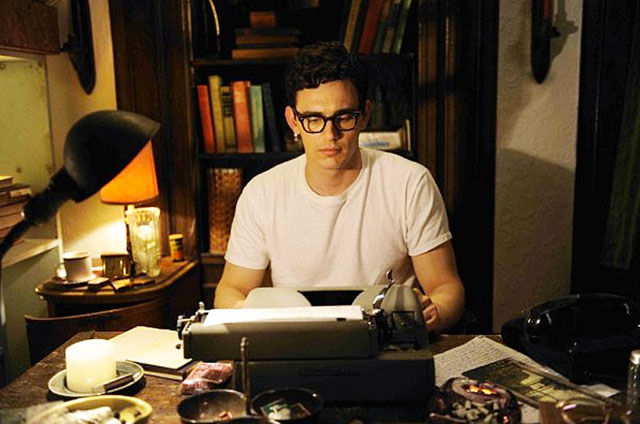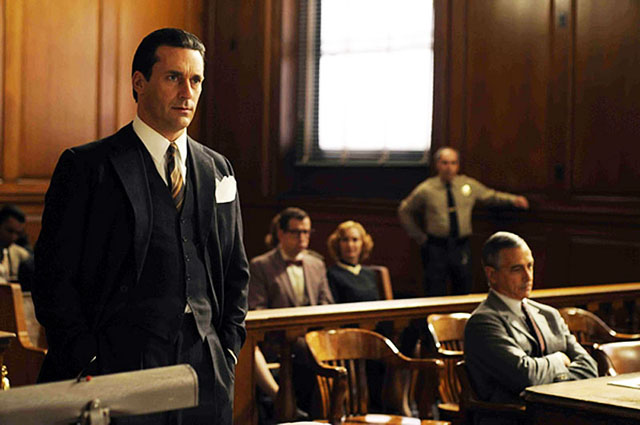CHICAGO – Patrick McDonald of HollywoodChicago.com appears on “The Morning Mess” with Dan Baker on WBGR-FM (Monroe, Wisconsin) on March 21st, 2024, reviewing the new streaming series “Manhunt” – based on the bestseller by James L. Swanson – currently streaming on Apple TV+.
Interviews: Directors Rob Epstein, Jeffrey Friedman of ‘Howl’
CHICAGO – The seismic shift that took place with the publication of Allen Ginsberg’s epic poem, “Howl” – which is also the title of the new movie about the verse – reverberates and inspires to this very day. The brilliantly rendered film, starring James Franco as Ginsberg, is written and directed by Rob Epstein and Jeffrey Friedman.
Ginsberg’s journey through the landscape that the film covers is near and dear to the hearts of these creators. The themes of alienation, industrialization and moral isolation in the poem Howl told a truth about America that no history book can convey. Epstein and Friedman use animation, true-life recreation and a landmark obscenity trial to tell the story of Howl, and the all-star cast of Franco, Jon Hamm, Mary-Louise Parker, Jeff Daniels, Treat Williams, David Strathaim and Bob Balaban move the narrative.
Epstein and Friedman are no strangers to shining a light in the controversial corners of our society. “The Times of Harvey Milk,” the Academy Award winning Best Documentary of 1984, was written and directed by Epstein, and was the basis for the narrative film version of “Milk.” As a team, they wrote and directed the notable documentaries “Common Threads: Stories from the Quilt” (1989), “The Celluloid Closet” (1995) and “Paragraph 175” (2000).
 Photo Credit: © Oscilloscope Pictures |
HollywoodChicago.com had a fascinating conversation with the duo, about Howl – the poem and the movie – and their crusading and substantial cinema career.
HollywoodChicago.com: Before you ever started this project, before you ever thought of it, when did you first encounter the poem ‘Howl’ and what does it mean to each of you?
Jeffrey Friedman: I think we both encountered it in high school, and had very limited understanding regarding what it was about, but I knew there was something liberating about it, and I do remember that ‘Moloch’ [Ginberg’s metaphor for capitalism] was a buzz word at the time of high school in 1969.
Rob Epstein: For me it was around 9th grade, which was middle school then, and I understood very little of it. Now I certainly have a better understanding of it, living with it all these years, now it has personal meaning because it was an important event in my life.
HC: How dangerous did you feel was it to use animation to interpret the poem? What was the initial feel you wanted in regards to that interpretation?
Epstein: Dangerous is a good word to describe it. We wanted it to have a little danger behind it. The poem certainly in its day, and even now, has a sense of danger to it. It’s challenging and provocative, and we wanted the film and animation to have both of those traits. We also wanted and hoped that animation would speak to a younger audience, since that is very much a part of the filmmaking vernacular of younger people.
Eric Dooker, the designer of the animation, was someone that Allen Ginsberg has already collaborated with, so there is a whole synergy to that idea.
HC: How meticulous was the historical recreation in both the courtroom and Ginsberg’s original reading of the poem? Or did you go for more a dream-like state for both, as in the animation?
Friedman: I wouldn’t say a dream-like state, we made it into a movie. [laughs] It’s not a documentary but it’s based on real events. In the reading we tried to recreate that gallery where Allen first read the poem for the first time, the Six Gallery in 1955 San Francisco.
Epstein: As it was described to us by living witnesses.
Friedman: But in terms of the performance of the poem we took liberties, because we wanted James Franco to have an opportunity to develop a performance, so we worked with dynamics within the scene and the way the audience reacts to the poem. The other recreations, like the courtroom, we worked from the few available photos that existed. And all of the interviews and flashback scenes were inspired by photographs that Allen took or friends of Allen took.
HC: In your opinions, what did ‘The Beats’ – Ginsberg, Jack Kerouac, Neal Cassady – sacrifice to expand the American mind?
Epstein: Of the three that you mentioned, Allen was the only one that lived to an old age. The others died relatively young and rather tragically. They lived hard and died young. Allen had the opportunity to live many lifetimes within his lifetime, and contributed a lot to our lifetime.
HC: How important is Allen Ginsberg in the evolution of gay liberation? What did he do best to inculcate himself into the evolution of that revolution?
Friedman: I think we were both surprised when we started exploring the themes in Howl, he talks about corporationalism, consumerism, he dehumanization of the culture and madness. But queerness is a really big theme in the poem, and we came to see it as a ‘queer manifesto’ in a way, among other things. The fact that he was making these open statements about his sexuality in the 1950s was really stunning to us.
 Photo Credit: © Oscilloscope Pictures |
HC: Your film was masterfully cast in a very particular and surprising manner. Did you get all your first choices, and when you were working with them, how much leeway did you give them to communicate the manner that they expressed in the film?
Epstein: We hit the jackpot with our cast, starting of course with James Franco as Allen Ginsberg, and to each and every actor they all came on board because they really like the script. They responded to the material, and most of them came on before we had the financing.
Friedman: We had a lot of time to work with James and his role, which was the biggest in the film. He came on earliest, and as we were waiting for financing, which gave us the opportunity to work with him several times over a year, so it was good preparation for the character. With the other characters we had very little rehearsal time, basically we had one meeting with them and the rest was on-set rehearsals. But they were all such professionals, they had all thought and talked about it, and came to the set with wonderful ideas.
Epstein: Then it becomes a question of when we’re all there, moving very quickly, you figure out how to work with each actor individually, how they work and how best to help them.
HC: There was an interesting close-up in the end. The simple clasped hands between Andrew Rogers and Jon Hamm. Why did you choose to switch to that historic clasping, what did you want to convey with the lingering?
Epstein: It was just a moment that the two characters were savoring, a moment of victory.
HC: After studying what was deemed obscene in 1957, what do you feel is truly obscene in our modern culture?
Epstein: Burning the Qur’an is one that comes to mind, which is emblematic of a kind of intolerance that should feel very un-American, but is unfortunately our dark side, and that’s what Howl was ‘howling’ about – our better natures and our worse natures. That’s what also makes the poem and the film so immediate.
Friedman: Cruelty, violence and war, which are all expressions of our dark side.
HC: Your documentary “The Celluloid Closet” communicates an important element of film history to both cinema students and the formerly ill-informed. Since the film industry relied so much on the gay contribution in its development, was there a self-hatred to early portrayals of gay characters, in your opinion?
Epstein: The movies reflect what it can see, not what it can’t see. Certainly a parallel can be drawn as to how gay men and women were living with that internalized sense of self-hatred and shame. It was a different world back then, and that’s how people were raised to think about themselves, the only way they were raised to think of themselves. In that sense, the movies reflected what the culture was saying. Until we started to claim our own identity, then the movies caught up.
HC: Rob, what was the most surprisingly characteristic of the great Harvey Milk that you came across in your work in ‘The Times of Harvey Milk’? What was his purpose as he lived and how important is he to you lionized in memory?
Epstein: When you are dealing with people like Harvey Milk and Allen Ginsberg, you can step back and see how they’ve become these iconic and historical figures. But when you are approaching it as a filmmaker, and trying to figure out what you want to say about them, you can’t think of it in such big terms. You have to try and break it down into its human parts, and try to find what it is about their humanity that you most feel compelled to tell as part of the story.
I think of Harvey as a man of his times who really understood the era that he lived in, and that’s the way we tried to contextualise him in the documentary. Allen similarly we worked on a very particular moment in his life. It’s really about this golden moment in the 1950s where he found his creative voice and that allowed him to become the Allen Ginsberg that is now the icon that we all know, love and revere.
HC: You and your film are given specific thanks in the credits of the recent film ‘Milk,’ how closely did you work with that production?
Epstein: I was an informal consultant, and I think my film was a consultant as well.
HC: Your next project is ‘Lovelace,’ regarding the female star of Deep Throat. What, in your opinion, has the mainstreaming of pornography done for this country, especially with the development of the internet, and where does Linda Lovelace fit in that path of deconstruction?
Epstein: I think you answered the question with your question. That is why the project is so interesting to us, to see where we were as a society at that point when she was a superstar of porn, to where we are now. How we got from there to here.
 | By PATRICK McDONALD |


